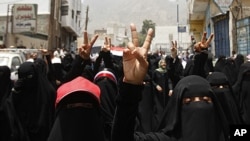When Yemen’s beleaguered President Ali Abdullah Saleh scolded women for violating Islamic law by joining men in demonstrations on the streets of Sana’a, more than 10,000 Yemeni women flooded those streets to denounce their president.
The women had joined the pro-democracy demonstrations in February 2011, the event that catapulted Yemen onto the world stage. The nation’s constitution gave women equal rights in 1994. But not until the national uprising and their April 16 march, could their veiled voices be heard. Their chants for the president’s removal echoed throughout Change Square.
Dr. Ahlam Mothanna, a medical doctor was one of 10 women who first joined the men in Change Square.
“Females in Yemen who participated in demonstrations were exposed to violence by military forces,” Dr. Mothanna said. In response, more and more women are demanding their rights be respected, she said.
Anita Kassem, a student from Aden and a friend, Madiha Ahmed, are two young women inspired by the revolution.
“We had to get out of our houses because our sons, our husbands, our brothers, and our fathers are dying in the square,” explained Anita.
She and her friend began working for charities as volunteers. They wanted to get more involved in the protests in Sana’a, but they had to calculate the political environment of the distant capital city, to get family permission to travel and overcome the fear of persecution.
Tradition
Most women in Yemen are marginalized. Anita and Madiha said Yemen is unlike Iran and Afghanistan where the opinions of women are grounded in law, constitution, and religion. Instead, Yemen’s opinion of women is based on tradition and custom. By law, you can work, you can talk to men and you do not have to wear a burqa or a hijab. But while the law gives women these rights, husbands and parents usually forbid it.
Some women have begun to leave their homes to go to college and to become teachers, social workers, nurses, and doctors like Ahlam. That’s possible in the capital city, Sana’a, but it’s a new phenomenon for Anita and Madiha, who live in Aden.
Madiha says that before the revolution, women accepted the conservatism and traditions that bound them to the home. They accepted this subordination, she says, “because they were unsure of themselves. They lacked self-esteem, lacked self-respect, and lacked self-responsibility.”
Change
Now, women in Sana’a and Taiz have joined the revolution, carrying food and water to protestors, teaching in the streets, or standing with the men, chanting, “The people want to overthrow the regime!”
Hamza al-Shargabi, a veteran of the protests, has watched women join his colleagues on the streets of Sana’a.
“Not so many people know that Yemeni women are very strong. They have been protesting in the streets with us since the first day," al-Shargabi said. "On the political level, the humanitarian level, and the logistical level, on the ground, women have stood beside men very, very naturally.”
It’s normal now to see a woman talking to men on the streets. They say they now have the support of their families and the respect of men. Proudly, Anita boasted that she and other women “… broke the chains of traditions and conservatism.” Women have proven that they are full citizens of the country who “stood hand in hand with men,” she says.
The pro-democracy revolution does not promise more rights to the women of Yemen, but the protesters believe women who joined the protests will be more than mothers and wives; they will be recognized as citizens of Yemen.
“The revolution demands equal treatment of one another,” said Hakim AlMasmari, editor of the Yemen Post. He thinks women have achieved greater equality -- and the men, as well.
“I do believe that Yemen will see more freedom after the revolution,” AlMasmari said.
Yemeni Women Find Voice in Revolution




